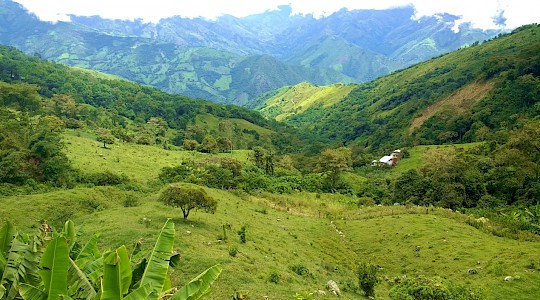
The Women of Anara: conducting field work in rural Colombia
Catégorie(s): Droits des femmes, Coopération volontaire, Groupes en situation de vulnérabilité, Colombie, 2017
By Leah Matthews
Seven hours by bus from Medellin – the regional capital of Antioquia province – followed by a two-hour walk into the Colombian countryside, lies the village of Anara. Women of the community have gathered under the canopy of a towering tree to escape the sweltering equatorial sun.
The topics of discussion? Peace. Justice. The role of women in this rural, patriarchal society. And the dreams they have for their future in the new Colombia, where last year the government signed a well-publicized peace accord to mark an official end to its 52-year war with the Revolutionary Armed Forces of Colombia (FARC). But although the political landscape of Colombian national politics may have changed, life goes on much as usual for the women of Anara.

“In one area they talk of peace, yet in others they still talk of war,” says one indigenous woman, who walked an hour to attend the group discussion. The site of the tree we are seated under is right next to the local school her son used to attend. As tears roll down her cheeks, she tells of how her son was murdered by members the Colombian military seven years ago, and how she has struggled to find legal representation to bring her case to the courts in an attempt to hold the government to account. Although “peace” is the official party line, justice remains elusive.
Anara lies in a region with a long history of armed conflict and high levels of poverty. For local women, their aspirations and visions of peace are far humbler than much of the lofty government rhetoric. Their vision of peace is one which includes economic opportunities, land title rights for women, equal treatment with men, and mental health support for the many victims of years of violence in the region.

Peace and Stabilization in Colombia: giving a voice to women
Through funding providing by Global Affairs Canada, Lawyers Without Borders Canada’s Colombia office is giving a voice to women in the Colombian peace process. In my capacity as volunteer legal advisor, I am conducting focus groups with women across the country, with the support of LWBC’s three permanent field officers. Not only has this been an incredible opportunity to see the stunning countryside of Colombia, but it has also brought to light the difference in access to justice for women in rural areas versus in the capital, Bogotá.
The women participating in the focus groups have all been affected by the armed conflict in different ways: some witnessed family members being killed by government or paramilitary forces, some were forcibly displaced from their land by FARC, all are victims in some capacity. We are carrying out this research in the four regions where LWBC has permanent field presence: Antioquia, Santander, Nariño and Bogotá. These comprise rural and urban areas, and were all impacted to different degrees by the five decades of conflict.
From this research, we are developing recommendations on how to incorporate the local needs of women into a more gender-sensitive transitional justice process. The findings of the research will be compiled in a report to be disseminated by LWBC in early 2018 to relevant actors in the Colombian government and implementers of the Colombian peace process.
From speaking directly with Colombian women, especially those in rural areas like Anara, the signing of the peace accord was clearly only a first step on a long road toward justice. I sincerely hope that by bringing their concerns directly to those in power through this project we can help to expedite this process.

